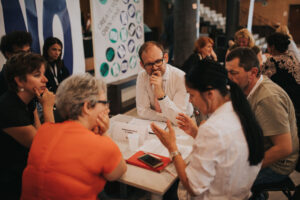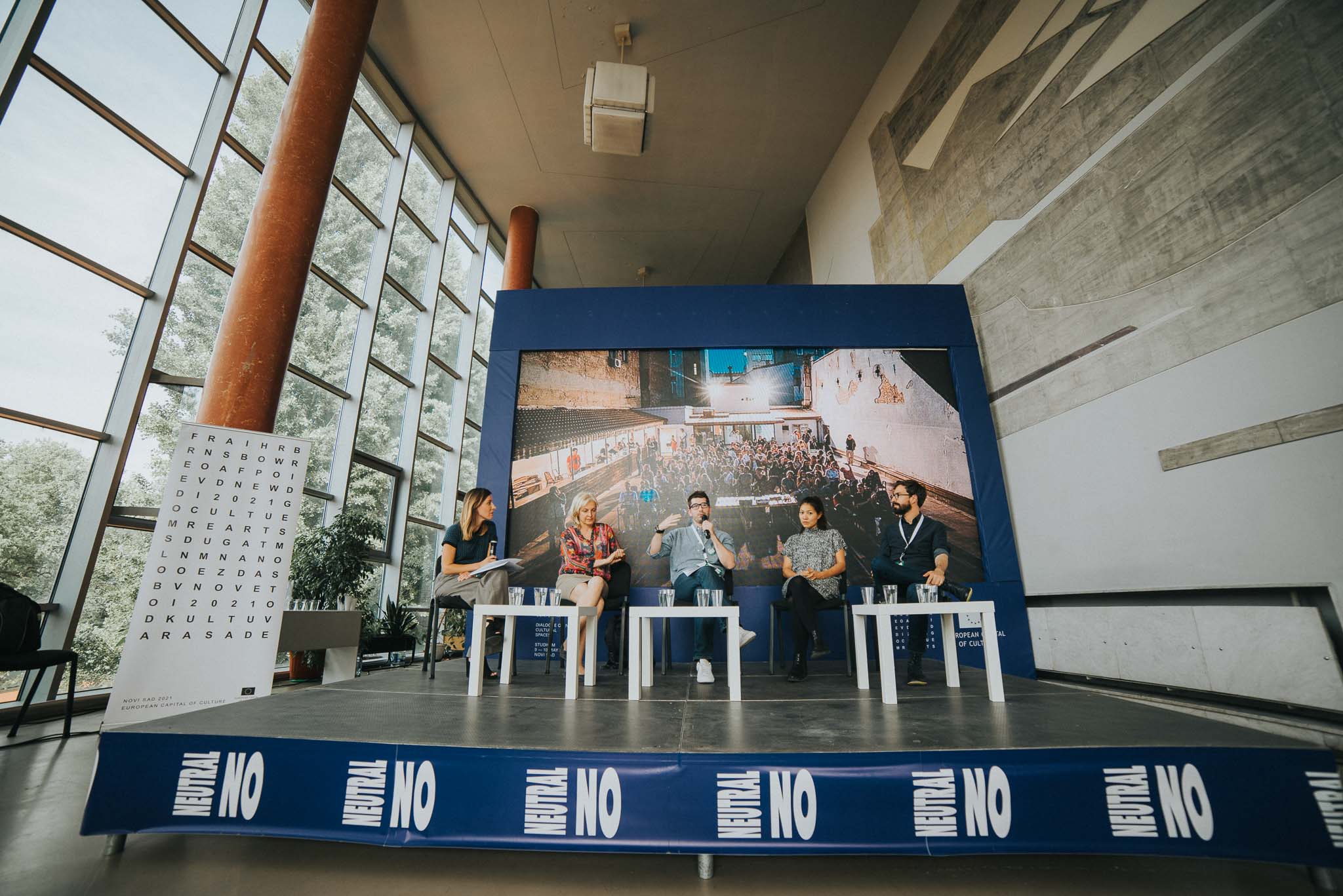During two days in the Studio M in Novi Sad, we had the chance to exchange a lot of experiences and get advice when it comes to cultural management, sustainability of cultural spaces and analysing, planning, implementation and assessment of cultural programmes and projects. The discussion was about audience development, different ways of financing in culture and creative industries, as well as the importance of connecting civil, private and public sectors and individual cultural stakeholders. We had the chance to compare the approach of European and Balkan models. It is of great importance that the audience had the chance to hear specific suggestions for solving problems and hear advice about attracting sponsors, investors and audience.
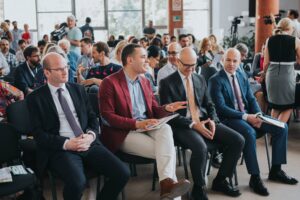
The conference was opened by the Mayor of Novi Sad Miloš Vučević, the Foundation CEO Nemanja Milenković and the President of the EUNIC Cluster Serbia Johanes Irschik. According to Nemanja Milenković, processes that have not taken place in the recent history of the city, are taking place now owing to the ECoC title: ‘The lower city of the Petrovaradin Fortress is being renovated after 300 years, industrial heritage is being renovated after 200 years i.e. ‘Svilara’ becomes a cultural station. The devastated space of the ‘Chinese Quarter’ is being transformed after 100 years, the Music School gets its permanent residence after 100 years, Liberty Square, Theatre Square and King Aleksandar Street get a new appearance after 70 years. For the first time, Novi Sad will get the city concert hall and small urban spaces that will be managed by citizens through the project ‘New Places’, with the aim of making culture a way of life and connecting people, cultural places and non-governmental organisations around the programme of the cultural centres’, as Mr Milenković stressed.
During the first panel, several different approaches to infrastructural projects within European Capitals of Culture were presented: turning the roofs of buildings in Linz into an open cultural space, 360-km-long pedestrian route that connects and networks the region of Marseille, revitalising buildings of industrial heritage in Rijeka and cultural stations as the network of new cultural spaces in Novi Sad. The conclusion of this panel was that concepts of infrastructural projects depend on specific social-historical contexts in which they are implemented, and that they should be adapted to a particular social community since financial sustainability (besides being recognised by the local authorities), depends on projects’ success and their relevance for a specific community. Social changes initiated by the European Capital of Culture are diverse and depend on a specific local context as well, and they range from new audience development to identity change and self-awareness of particular social communities, networking and partnership building between public, civil and private sectors to cultural decentralisation and activating passive citizens.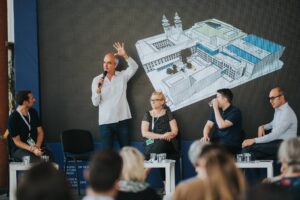
Participants of the second panel ‘Cultural spaces between market and sociability – how to balance between the two?’ were the representatives of the independent cultural spaces ‘Die Bäckerei’ from Innsbruck, ‘UFA Fabrik’ from Berlin, ‘Grad’ European Cultural and Debate Centre from Belgrade, and the former Secretary General of the ‘Trans Europe Halles’ Network of Independent Centres. Panellists, each from their own experience, gave suggestions for generating income through different contents (bar, restaurant, space renting, selling tickets). They especially underlined the importance of space management, where we should avoid classical hierarchical structure and make conditions for negotiations and decision making through a consensus. In this manner, different values and beliefs are being unified and that is specific for each and every space and cannot be applied to any other space. What is important for every space is its purpose i.e. identity based on an organic process and mutual growth of all stakeholders involved.
Participants of the third panel ‘The culture of participation – how to develop proactive communities?’ had a discussion about European cultural politics, different forms of involving citizens in cultural activities and how proactive communities look like. They presented the ways in which their organisations mobilise a community, gave particular suggestions about involvement of citizens in cultural activities and creative ways for audience development. They concluded that accessibility and close contact with citizens are the most important precondition for activation and they agreed that high level of citizens’ participation in cultural activities could significantly contribute to creation of proactive communities in which all individuals are equally valued and included.
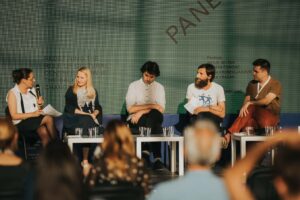
Cultural centres in the Balkans work in the context which has a lot in common and their connection and cooperation are natural processes. If they are being created by listening to and addressing actual needs of a community, the energy needed for this action has been triggered, which is immanent part of the process of the development of cultural centres and it is not negative itself. On the contrary, activist actions and processes form and develop all stakeholders and they are constructive when they encourage their core communication. These are some of the basic conclusions of the ‘Redefining the role of cultural centres – How is the Balkans changing?’ panel. Redefining roles is being done through transformation from cultural into social – cultural or community centre, based on listening to the new needs of a community. For the communities in the Balkans, the role of these centres was partially played by the so-called ‘Houses of Culture’, whose tradition in using participation should not be rejected. We should instead use their great potential in order to reinterpret their role in current circumstances. Exchange of experiences is of great importance for all stakeholders in the field of culture and that is the reason why the conference where many different experiences form all over Europe can be heard is invaluable for cultural scene development in the Balkans.
Workshops held on 10 May dealt with audience development, crowdfunding and social activism problems.
Nana Radenković from ‘Nova Iskra’ presented experiences of their creative hub and models for audience development, as well as development of individuals and organisations that work in cultural and creative industries sectors. Affiliation towards lifelong education, experience exchange, networking and openness are crucial for understanding the world in which we live and problems we have to overcome. For stakeholders in culture and creative industries, it is important to listen and analyse changes in society and economy, and reassess their place in new circumstances so that they could successfully answer to all audience needs: not to assume, but to be in contact with their audience constantly, do research, surveys and check if beneficiaries are satisfied; to be aware, in every moment, of needs, expectations, emotions and impressions audience has gained in every moment since they will share such experiences. This is crucial in order to create an offer that will be special, specific and different from everything else being offered at the same time in the same place. 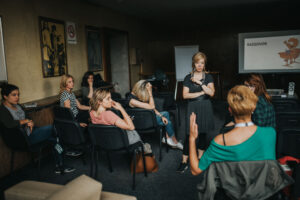
Vladica Jovanović from ‘Brodoto’ agency was talking about potentials and reaches of crowdfunding in the region. Workshop participants could hear in which way different crowdfunding platforms function, how these types of campaigns can be managed, where audience can be found, in which way crowdfunding can be effectively linked with social activism and increase positive impact on a community.
On the second conference day, the special event was the EUNIC Café during which representatives from cultural institutions in Novi Sad and Zone 021 had the chance to present their institutions and concrete programmes through time limited discussions with representatives of the EUNIC Serbia cluster, and achieve personal and direct contact.
